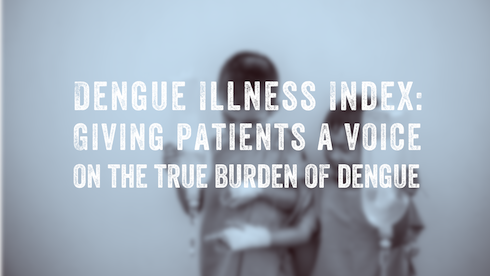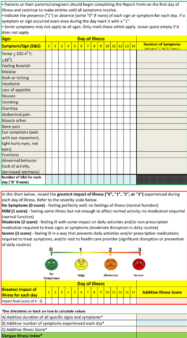- by Alison
Dengue Illness Index: Giving patients a voice on the true burden of dengue

It’s nearly five years since the International Federation of the Red Cross (IFRC) published its report Dengue: Turning up the volume on a silent disaster, which in part explores the burden of dengue. Noting that “approximately 60% of dengue-related costs are not directly associated with healthcare expenditure”, it highlights the indirect costs borne by patients and their families: “On average, between 14.8 and 18.9 days are lost as the patient is incapacitated or a family member needs to stay at home.”
All too often, costs, complex logistics and an inability to capture data in a manner acceptable to regulatory agencies. As a result, clinical trials for dengue vaccines and treatments ignore these aspects of the burden of dengue in their deliberations. The Dengue Illness Index (DII) hopes to change that.
“Trials typically measure a couple of days of fever and a positive dengue test, or hospitalization and/or severe disease. Clinical scenarios in between may still be relevant,” says Professor Stephen Thomas, Director of the Institute for Global Health and Translational Sciences at the State University of New York Upstate Medical University. “There’s clinically relevant disease occurring that a vaccine or drug might impact. The people who make decisions about licensing or using vaccines would benefit from understanding that impact – but researchers are challenged how best to measure it. We haven’t figured out how to.”
The true burden of dengue
Researchers know how much is being spent and what the clinical outcomes are for people hospitalized with severe dengue. But most people with dengue are managed as outpatients. “Even though it’s not as clinically severe, the burden of outpatient dengue, when you consider all of its impacts on the individual and the family, is considerable and from some perspectives more than the burden of inpatient dengue,” says Professor Thomas.
He gives an example of a child home from school because they have dengue: “They’re not sick enough to be admitted to the hospital, but they cannot attend school. Therefore, someone needs to stay home with the child, which means this person may lose a day’s pay since they cannot go to work. The child may need frequent assessments as an outpatient, which means paying for transportation, perhaps the doctor’s visit, maybe a blood test, food and perhaps medication such as paracetamol. You can see where the economic cost of dengue can become significant, especially for people who are economically disadvantaged.”
During vaccine trials, researchers have to capture endpoints that are objective and reproducibly measurable across many regions to assess vaccine safety and efficacy. Assessing fever and testing the blood for evidence of a dengue virus infection is the current standard. Later in trials, the researcher may only assess hospitalized cases. By approaching studies in this way, there may be an entire spectrum of clinically relevant disease that is not being evaluated and, as such, there is a missed opportunity to expand the perspective on the potential impact of vaccines or drugs.
“What if you could measure these relevant but often not measured patient experiences?” asks Professor Thomas. “If the person who had a placebo had a four-day illness experience and a person who had the vaccine had a two-day illness experience, the overall clinical severity would have been shifted towards a less severe disease scenario and, by extension, the overall individual and public health impact would have been mitigated. When you’re talking about an estimated 96 million symptomatic dengue virus infections each year around the globe, this impact could be substantial. I propose we explore how to measure what is currently a grey area.”
Researchers need to understand whether experiences differ between those receiving a placebo or control and those receiving the experimental product. To gain new perspectives on the potential benefits of vaccines and drugs, they need to give the vaccine recipient a voice.
A dengue index for researchers
Back in the ‘80s and ‘90s, the professor’s mentors, including his current partner in the project Dr. Robert Edelman from the Center for Vaccine Development at the University of Maryland, developed a ‘dengue severity index’. During trials, they would ask volunteers whether they had any symptoms, then grade the severity by assigning numeric values. Professor Thomas explains how the final number “helped them gauge which volunteers were having unacceptable adverse reactions to the vaccines and their severity and whether the vaccine candidates were suitable and appropriate for further clinical development.”
The World Health Organisation also developed its own dengue severity classification in the late ‘90s, updating it in 2009. Professor Thomas makes a point, however, that the WHO indices are distinctly different from his and Dr. Edelman’s proposal. The Illness Index was developed to support clinical research, not clinical care, and does not intend to classify severity.
Fast forward 15 years. Professor Thomas was attending a conference co-sponsored by the US National Institutes of Health where the intention was to re-look at classifying dengue severity to support research initiatives. It was here that Drs Thomas and Edelman began to work together on updating the severity index. “We pulled the previous index off the shelf and reworked it,” says Professor Thomas.
The new index was designed to give patients a voice: What symptoms do I have? How bad are they? What impact is dengue having on my daily activities? Can I assign a numeric value to this experience for comparisons between people and groups?
DII: Measuring patients’ experience of dengue
The Dengue Illness Index (DII), as the professor’s paper, describes, “was developed to improve and standardize the measurement of vaccine and drug efficacy in reducing moderate dengue illness by capturing the overall subjective disease experience of an individual based on how the totality of their symptoms impacts their wellness and daily functionality.”

In other words, it’s a tool for capturing the patient’s experience of dengue (rather than characterizing dengue severity) that is intended to support research (rather than clinical management of the disease). The information it provides could be valuable for understanding the impact – or lack of impact in some cases – of either preventative or therapeutic drugs or vaccines.
“The Dengue Illness Index aims to help us understand what the person with dengue is experiencing and how it impacts their overall functionality,” says Professor Thomas. “We are currently using it in a prospective dengue study in the Caribbean.”
The SUNY Upstate Medical University in New York, where the professor works, will be using the index during 2019 in its experimental human infections to support the dengue vaccine and drug development.
Regulatory approval for the Dengue Illness Index
A large pharmaceutical company is also investing in the DII, taking it to the next level. “Putting it into a Patient Measured Outcome (PMO) format that would generate data of sufficiently high quality for a regulatory agency to accept,” reveals Professor Thomas.
The updates could take almost 18 months. According to the professor, for regulatory authorities to accept the index, questions need to be asked in a way that ensures researchers don’t introduce bias. The index must also be cross-cultural, cross-language and easy to sell to volunteers. “It has to be in a platform that people are willing and interested in filling out,” he says.
Sign the petition for an official World Dengue Day
The pharmaceutical firm also intends to make the Dengue Illness Index available to others. In the longer term, Professor Thomas would like to see the index provided in a web-based format that people could access with their phone. “Pushed to a volunteer with the information gathered going into a cloud,” he concludes.
We can’t wait to see how the Dengue Illness Index will evolve in the coming months and years. Get in contact with us if you are working on your own version of the index.
And we’d also love to hear about your personal dengue experiences. How did this terrible disease affect you and your family?
—
Help reduce the impact of dengue near you, click below to report dengue activity near you to Dengue Track.

